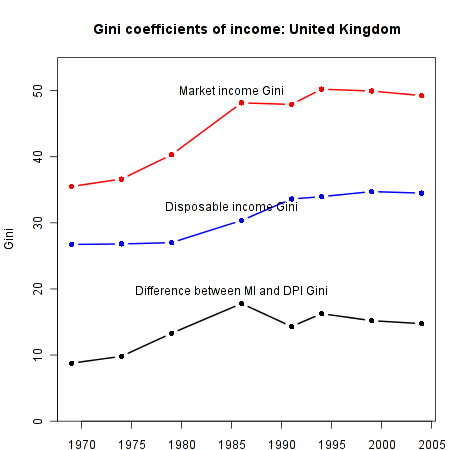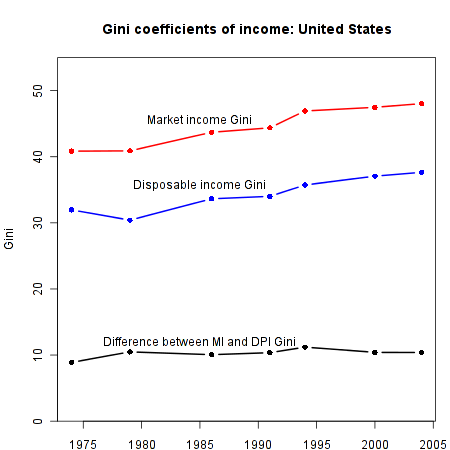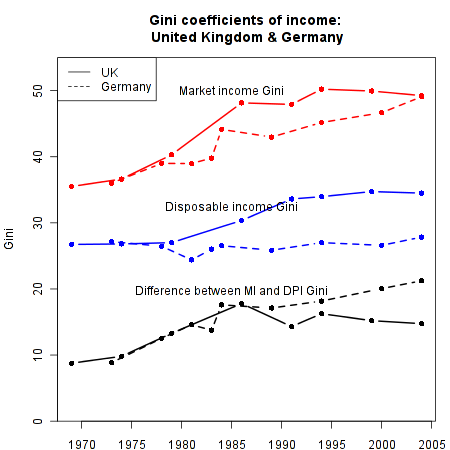Redistribution Under Neoliberalism
August 8th, 2011 | Published in Data, Political Economy, Politics, Social Science, Statistical Graphics, xkcd.com/386 | 8 Comments
Last week, Seth Ackerman wrote a *Jacobin* [blog post](http://jacobinmag.com/blog/?p=891) in which he gave us a snarky attack on the record of "left neo-liberalism" in the United Kingdom. Basically, he showed that while New Labour managed to reduce poverty somewhat with cash transfer programs, the progress was meager and could not be sustained. Since the programs were financed out of a series of asset bubbles, the UK has seen poverty go back up again with the recent crisis.
I don't have much quarrel with this account, but I'm not sure it can bear the weight of the argument that Seth wants to put on it. He suggests that the UK experience is a refutation of the general strategy of progressive neoliberalism, which Freddie DeBoer felicitously dubbed ["globalize-grow-give"](http://lhote.blogspot.com/2011/01/globalize-grow-give-progressivism-and.html):
> First, you embrace the standard globalization model of reduced or eliminated tariff walls, large free trade agreements such as NAFTA or CAFTA, deregulation, and general trade liberalization. This encourages international trade and the exporting of jobs from highly-regulated, fairly well compensated, high worker standard of living places like the United States to the cheap labor, low regulation, low worker standard of living places like China or Indonesia. This spurs international economic growth in both the exporting and importing countries. Here at home, higher growth results in higher tax revenues which can then be redistributed from those at the top of the income distribution (who have benefited from the globalized trade regime) to those at the bottom of the income distribution (who have been hurt by the globalized trade regime that undercuts their wages and exports their jobs).
I think that if you want to really criticize this view, you need to look beyond the UK, which is neither a very generous nor a particularly well-designed welfare state. As it happens, my day job involves analyzing cross-national income data, so I'm going to perpetrate some social science on y'all.
The way I read the "globalize-grow-give" critique, you can extract an empirical claim about how the income distribution should look in a G-G-G economy. The distribution of income *before* taxes and transfers will become increasingly unequal due to deregulation and globalization, but the distribution *after* taxes and transfers are accounted for will not become vastly more unequal because government is compensating for the inequality in the private market.
To test this, I did some simple calculations, following other researchers who have done [similar](http://www.lisproject.org/publications/liswps/392.pdf) [things](http://www.lisproject.org/publications/liswps/458.pdf). Using data from the [Luxembourg Income Study](http://www.lisdatacenter.org/), I calculated the [Gini coefficient](http://en.wikipedia.org/wiki/Gini_coefficient), a standard measure of inequality, for several different countries. I calculated two different Ginis:
- The Gini of *market income*. Market income is defined here as income from wages, pensions, self-employment and property. This is income *before* any taxes or transfers are accounted for.
- The Gini of *disposable income*. This is the income that people actually have to spend, after taxes are deducted and any transfers are added in. (For more details about the variables, see the postscript).
Unfortunately, the difficulty of harmonizing cross-national data means that the numbers I have access to are a bit out of date--specifically, they end before the current crisis period. I still think we can learn something useful from them, however. The way G-G-G neoliberalism is supposed to work, the Gini of market income should go up but the Gini of disposable income should not--or at least should rise more slowly. We can think of the difference between market income inequality and disposable income inequality as a rough measure of the amount of redistribution done by the state.
So here's what things look like in the UK:
This figure basically supports Seth's argument. Market income inequality has gone way up in the last few decades, but disposable income inequality has gone up by a lot as well. The state is doing a bit more redistribution than it used to, but not enough to make up for the rise in private-market inequality. If you look at the United States, the situation is even worse, as the state has done essentially nothing to counter rising inequality in market income:
The question, though, is whether it has to be like this. Let's put the UK alongside another rich European economy, Germany:
Here we see something very interesting. Before you take taxes and transfers into account, the rise in inequality in Germany looks very similar to what happened in the UK--indeed, the two countries converge to almost the same value by 2005. But disposable income inequality has stayed flat in Germany, because the German state has used taxes and transfers to counteract rising inequality.
Every good social democrat loves the Nordic model, so let's finish off with a look at Sweden:
Here the story is a bit different--both market income and disposable income inequality have remained pretty flat, although both have risen a bit. The important thing to note here is that even in the most socialist of welfare states, market income inequality is very high, nearly as high as it is in the UK or US. The fact that Sweden is one of the least unequal countries on earth has to do almost entirely with taxes and transfers.
So what can we conclude from all this? Let me be clear that I don't think this is a knock-down argument in favor of "globalize-grow-give" as a political model. But I think the best argument against the G-G-G model is not that it's economically impossible or dependent on asset bubbles. Rather, I'd point us back to the political arguments enumerated by [me](http://www.peterfrase.com/2011/07/policy-politics-and-strategy/), [Henry Farrell](http://crookedtimber.org/2011/07/25/neo-liberalism-the-submerged-state-and-the-politics-of-nudge/), and [Cosma Shalizi](http://cscs.umich.edu/~crshalizi/weblog/778.html) among others. What makes Sweden and Germany different is not that their economies are different from those in the US and UK (although they are), but that they have different political environments, featuring things like a hegemonic Social Democratic party in Sweden and a strong labor movement in Germany.
So if left-neoliberalism is to be a workable political agenda rather than the motto of useful idiots for the "globalize-grow-keep" agenda of the right-wing neoliberals, it has to either make its peace with the sources of working-class power that currently exist, or else come up with workable models of what might replace them.
*[Postscript for income inequality nerds only: the income variables are equivalized for household size using the square root of the number of persons in the household as the equivalence scale. The variables are then topcoded at ten times the equivalized mean and bottom-coded at 1 percent of the equivalized mean.*
*Note that the transfers included in disposable income are only cash transfers and "near-cash" benefits (like food stamps), not in-kind services like health care. So you could argue that this data actually understates the extent of redistribution.*
*If you'd like to look at the data, including a bunch of countries I didn't include in the post, it's [here](http://www.peterfrase.com/wordpress/wp-content/uploads/2011/08/mi_dpi_gini1.csv). For help interpreting the country codes, go [here](http://www.lisdatacenter.org/our-data/lis-database/documentation/list-of-datasets/)]*




August 8th, 2011 at 4:19 pm (#)
Sure. But by the same token, people who want to improve the living standards of working class people need to stop shitting on the idea of economic growth and redistribution. You think you’re agreeing with Henry Farrell, but I think the position you’re outlining here is much closer to mine and the dread neoliberalism. If you look around the world the only successful egalitarian policy agenda over the past 20 years has been tax-and-transfer policies.
Getting the politics of sustainable tax-and-transfer right are important. But one key first step on that path is to get progressive intellectuals to admit to themselves that progressive taxation and income redistribution are in fact the policy objectives we’re aiming for.
August 8th, 2011 at 6:14 pm (#)
Yeah, I should have made this clear in the post, but we aren’t really very far apart on this, and I’m pretty friendly to tax-and-transfer as a policy objective–particularly since the main alternative on offer from left-liberalism seems to be a vague nostalgia for the economy of the 1950’s, which doesn’t strike me as being more realistic or more desirable.
It’s more a difference in emphasis, I think–your priority is to convince people of the rightness of the policy agenda, whereas I’m more concerned with figuring out what political forces are capable of fighting for and defending that agenda, which is where I saw Farrell as coming from as well. The difference probably stems in part from who we conceive of as our audience and what we think they need to be convinced of.
August 8th, 2011 at 8:50 pm (#)
Peter Frase,
I can’t pass up the opportunity to comment. See, my best buddy has just spent two years in India (his first year was on a Fulbright Scholarship) and his experience made him very sympathetic to the left-wing side in many of these debates (while I usually take the neoliberal side). We’re both still fluid, with prima facie leanings (he’s already convinced me of the need for more attention paid to the needs of particular countries when it comes to IMF policy, a topic I didn’t have a position on before).
The funny thing about these debates is we both claim the Nordic countries as counting in our favor.
So, why is it that the left (as opposed to neoliberalism) claims the Nordic model as counting in its favor? I understand that Labor Union membership is very high in Nordic countries, but the “flexicurity” model seems more neoliberal than leftist (at least leaving aside what Henry Farrel calls the “theory of politics”). As a matter of fact, (not knowing much about labor law in these countries, so I could be wrong) with a flexible labor market like they have, I can’t imagine that unions have the legal negotiating power they aspire to in the U.S., though they could have remarkable de facto power by virtue of their numbers.
So is it that:
1) I’m wrong and labor (trade) unions do force large concessions on the part of business, backed by laws requiring business to not to fire striking workers, or requiring businesses to spend X amount of time negotiating,
or is the idea that
2) The Nordic countries’ high union membership (or perhaps the Social Democratic Party organization) constitutes a highly mobilized political movement that has had its influences felt through relatively egalitarian policies (even if said policies are admired by neoliberals)?
Cuz I’ve got to say, if the idea is just that the Nordic countries simply have a uniquely high level of social trust, so the Nordic model could never be implemented in the U.S. because of social/political constraints, then I’m not sure where that leaves us. It could mean that we should try and approximate “flexicurity” as closely as possible, or it could mean that we should go the leftist route, given our political constraints. But it doesn’t seem to necessarily answer the question. So whether neoliberals are in danger of being useful idiots for the “globalize, grow, and keep” crowd still depends, it seems.
August 9th, 2011 at 9:13 am (#)
It might be interesting to perform a similar analysis of data from Japan, a society that achieves economic equality by limiting the large disparities between wages in the first place.
August 9th, 2011 at 5:53 pm (#)
[…] or communities with high disparity between the very rich and the very poor are more violent, and inequality in the UK has increased significantly over the past 30 years. An unemployed, racially marginalized young male in Tottenham is likely […]
August 13th, 2011 at 7:40 pm (#)
Jay Jeffers: There is no Nordic model. Flexicurity is Danish, not Nordic.
August 19th, 2011 at 10:08 am (#)
[…] choices: They use taxes and transfers to achieve the social aspirations that the market does not. Redistribution Under Neoliberalism :: Peter Frase A more redistributive system is not pie in the sky or 'ideal world', it's a political choice. Does […]
December 27th, 2011 at 9:21 am (#)
Thanks.